
European Journal of Law and Economics
Scope & Guideline
Empowering Research through Rigorous Interdisciplinary Dialogue
Introduction
Aims and Scopes
- Law and Economics Interactions:
The journal consistently explores how legal rules and frameworks impact economic outcomes, including market behavior, compliance, and efficiency. - Empirical Analysis of Legal Frameworks:
Research often employs quantitative methods to assess the effectiveness of laws and regulations, utilizing data to inform conclusions about legal impacts on economic performance. - Policy Evaluation:
The journal includes studies that evaluate the socio-economic effects of specific laws and policies, providing insights that can guide future legislative changes. - Comparative Legal Studies:
A focus on comparing legal systems and their economic implications across different jurisdictions, allowing for a broader understanding of global legal-economic dynamics. - Interdisciplinary Approaches:
The journal welcomes contributions that integrate insights from sociology, political science, and behavioral economics into legal analysis.
Trending and Emerging
- Digital Economy and Regulation:
Recent publications highlight the importance of understanding legal frameworks surrounding digital platforms, cryptocurrencies, and data privacy, reflecting the rapid evolution of the digital economy. - Environmental Law and Economics:
There is an increasing focus on the economic implications of environmental regulations, including studies on corporate compliance with environmental laws and the effects of policy on sustainability. - Labor Law and Market Dynamics:
The journal is seeing a rise in discussions around labor market regulations, including minimum wage laws and employment contracts, particularly in the context of economic recovery post-pandemic. - Diversity and Inclusion in Governance:
Emerging themes around gender diversity in corporate governance and the economic impacts of inclusive policies are gaining traction, indicating a societal shift towards equality. - Legal Aspects of Emerging Technologies:
Research on the legal implications of artificial intelligence, blockchain, and other emerging technologies is on the rise, reflecting the need to adapt legal systems to new technological realities.
Declining or Waning
- Traditional Antitrust Analysis:
Research specifically focused on conventional antitrust issues appears to be less prevalent, possibly due to the evolving nature of competition law and the rise of digital economy considerations. - Basic Contract Law Studies:
There seems to be a waning interest in fundamental studies of contract law, with fewer papers addressing basic principles as the field becomes more specialized and focused on complex scenarios. - Judicial Behavior Studies:
While judicial efficiency remains a topic of interest, broader studies on judicial behavior and decision-making processes have decreased, possibly overshadowed by more pressing economic and policy-oriented analyses. - Human Rights and Legal Theory:
Themes centering around abstract human rights discussions and legal theory may be declining as empirical and applied research takes precedence in the journal's recent publications. - Regulatory Compliance in Traditional Industries:
Research addressing regulatory compliance issues in traditional sectors has seen reduced representation, likely as attention shifts toward emerging sectors such as technology and finance.
Similar Journals
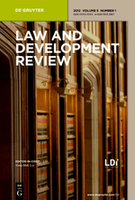
Law and Development Review
Transforming Legal Perspectives into Developmental SolutionsLaw and Development Review, ISSN 2194-6523, published by WALTER DE GRUYTER GMBH, stands as a vital scholarly outlet in the interdisciplinary nexus of law, development, and economics. Based in Germany, this journal seeks to catalyze rigorous discourse and research on the critical interactions between legal frameworks and developmental strategies, as indicated by its classification in the Q3 and Q4 quartiles across various relevant categories. With a convergence of scholarship from 2012 to 2024, it offers an invaluable platform for researchers and practitioners aspiring to engage with contemporary challenges in governance, social justice, and economic policy. Despite its relatively recent establishment, the journal's impact is evidenced by its positioning in Scopus rankings, showcasing its academic merit and relevance. While it operates under traditional access models, Law and Development Review remains committed to enriching the body of knowledge in its specialized fields, making it an essential resource for anyone invested in the interplay of law and development.
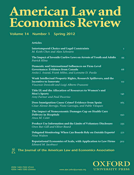
American Law and Economics Review
Exploring Economic Insights in Legal FrameworksAmerican Law and Economics Review, published by Oxford University Press, is an essential journal for those engaged in the intersection of law and economics. With a focus spanning from 2005 to the present, this journal critically examines the role of economic principles in legal frameworks and policy-making. With an impressive classification as Q2 in Law and Q3 in Finance for 2023, it holds a distinguished position in both fields, ranking 313th in Law and 194th in Finance according to Scopus. Although it does not currently offer open access, its robust research contributions provide invaluable insights for academics, practitioners, and policymakers alike, reinforcing its significance in scholarly discussions and enhancing our understanding of legal systems through an economic lens.
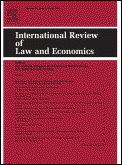
INTERNATIONAL REVIEW OF LAW AND ECONOMICS
Illuminating the Nexus of Law and Economic Analysis.The INTERNATIONAL REVIEW OF LAW AND ECONOMICS, published by Elsevier Science Inc, stands as a premier academic journal dedicated to the interdisciplinary exploration of law and economics since its inception in 1981. With an impressive convergence of insightful research and theoretical advancement, the journal encapsulates critical findings that bridge legal studies and economic principles. Ranked in the Q2 category for Economics and Econometrics and Finance, alongside a notable Q1 ranking in Law, it highlights its significant influence and high-quality scholarship within the academic community. The journal is indexed in Scopus, achieving commendable rankings which reflect its importance, ranking #188 out of 1025 in Law and #343 out of 716 in Economics and Econometrics. With no Open Access option specified, readers are encouraged to engage with the content through institutional access or subscription. This journal is essential reading for researchers, practitioners, and scholars looking to deepen their understanding of how legal frameworks intersect with economic theories, making it a vital resource in both fields.

BUFFALO LAW REVIEW
Advancing Legal Discourse and AnalysisBUFFALO LAW REVIEW, published by University at Buffalo State University of New York, stands as a pivotal resource in the field of law, offering a comprehensive platform for scholarly discourse and analysis. With an ISSN of 0023-9356, this journal has been disseminating critical legal research since its inception and is currently recognized in the Q2 category of Law for 2023. Although it operates under traditional access options, its significant contributions to legal scholarship are underscored by its positioning alongside notable peers, as evidenced by its rank of #552 out of 1025 in the Scopus rankings for Social Sciences _ Law, reflecting a 46th percentile placement. The journal spans an extensive timeline of converged years, notably including a continuous publication record from 1973 to 2024. Researchers, professionals, and students alike will find BUFFALO LAW REVIEW an essential repository of legal scholarship, discussing key issues and evolving trends within the domain.

University of Pennsylvania Journal of International Law
Engaging Scholars in the Dynamics of International LawThe University of Pennsylvania Journal of International Law is a pivotal academic publication that serves as a forum for groundbreaking legal scholarship, particularly in the complex and dynamic field of international law. Published by the University of Pennsylvania Law School, this journal supports a diverse array of interdisciplinary research and discourse, capturing insights that bridge legal, economic, and political landscapes. As of 2023, it is positioned in Quartile 3 in Law and Quartile 4 in Economics according to Scopus rankings, underscoring its relevance and contributions to legal academia. The journal is accessible through conventional methods, with its physical presence anchored in Philadelphia, Pennsylvania. With a commitment to fostering dialogue on both emerging and traditional legal issues, the journal aims to engage scholars, practitioners, and students alike, encouraging contributions that enrich understanding and drive progressive legal thought. This commitment to academic excellence ensures that the University of Pennsylvania Journal of International Law remains a vital resource for those seeking to navigate the challenges of international legal frameworks.

Revista Juridica Portucalense
Fostering Scholarly Dialogue in Law and Political ScienceRevista Juridica Portucalense, published by the Universidade Portucalense Infante D Henrique Cooperativa de Ensino Superior in Portugal, stands as an influential peer-reviewed journal focusing on the fields of Law, Political Science, and Sociology. With an ISSN of 2183-5799 and an E-ISSN of 2183-5705, this Open Access journal has made significant strides in promoting scholarly research and academic discourse since its launch in 2014. The journal is categorized in the Q3 quartile for 2023 across its respective disciplines, highlighting its growing impact within the academic community, despite its current H-index rating still being unestablished. With a Scopus ranking pointing to its dedication to quality scholarship—ranked #724/1025 in Law and maintaining a presence in Political Science and Sociology—Revista Juridica Portucalense is an indispensable resource for researchers, practitioners, and students alike who are eager to engage with contemporary legal issues and the interplay of political and social dynamics.

Ius Humani-Revista de Derecho
Fostering Innovation in Human Rights LawIus Humani-Revista de Derecho, published by Universidad Hemisferios, serves as a vital platform for discourse in the field of human rights law and its various dimensions. With an Open Access policy established since 2008, this journal ensures that scholarly articles, critical reviews, and original research are readily accessible to a global audience, fostering collaboration and innovation among researchers, professionals, and students alike. Although the journal is based in Quito, Ecuador, its reach extends internationally, making significant contributions to the understanding and application of human rights in legal frameworks. While it is still developing in terms of its HIndex and Scopus rankings, Ius Humani is poised to provide essential insights and discussions that reflect pressing legal issues and emerging trends in human rights law. Join the community of scholars engaging with this important field through Ius Humani, where knowledge is freely shared and impactful conversations are sparked.

National Taiwan University Law Review
Fostering Legal Discourse Across AsiaNational Taiwan University Law Review, with ISSN 1812-6324, is a prestigious academic journal published by the NATIONAL TAIWAN UNIVERSITY COLLEGE OF LAW. As a pivotal platform in the field of law, this journal aims to foster scholarly discourse and promote the exchange of ideas regarding legal theories, practices, and developments, particularly within the context of Taiwan and the broader Asian legal landscape. Although it does not currently offer open access, its selectivity ensures a high standard of peer-reviewed research, appealing to researchers, legal practitioners, and students alike. The journal's commitment to exploring contemporary legal challenges and ideologies positions it as an essential resource for those seeking to enhance their understanding of the dynamic legal systems in Asia and beyond. Located in Taipei City, Taiwan, the National Taiwan University Law Review invites contributors and readers who are passionate about advancing legal scholarship and practice.
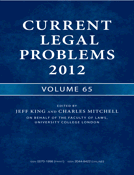
Current Legal Problems
Exploring the forefront of contemporary legal challenges.Current Legal Problems is a premier academic journal published by Oxford University Press, dedicated to advancing the field of law through critical analysis and interdisciplinary research. With an ISSN of 0070-1998 and an E-ISSN of 2044-8422, this journal has established itself as a vital resource for legal scholars and practitioners alike since its inception in 1983. Recognized with a Q1 category ranking in Law for 2023, it ranks notably in Scopus as #415 out of 1025, placing it in the 59th percentile, further underlining its influence and importance. The journal's scope encompasses contemporary legal issues, providing a platform for innovative legal thought and discussion. Although it does not follow an open access model, the journal remains accessible through both print and digital subscriptions, catering to a global audience from its base in Oxford, United Kingdom. Researchers, students, and legal professionals will find Current Legal Problems indispensable for staying informed about the latest legal developments and scholarly debates.
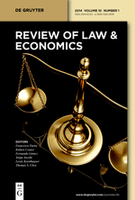
Review of Law & Economics
Fostering Insightful Dialogues on Legal and Economic Intersections.Review of Law & Economics, published by WALTER DE GRUYTER GMBH, serves as a pivotal platform in the intersecting realms of law and economics, with its open access policy initiated in 2016 to promote wider dissemination of research. Based in Germany, this journal aims to foster insightful discussions and innovative research that bridge the gap between legal frameworks and economic principles. With an impact factor reflected in its Q2 rank in Law and Q3 rank in Economics, Econometrics and Finance as per the 2023 category quartiles, it positions itself as a significant contributor to scholarly works in both fields. The journal's unique approach highlights a comprehensive analysis of legal issues through an economic lens, making it invaluable for researchers, professionals, and students alike. As it encompasses a broad spectrum of topics from regulatory analysis to market dynamics, the *Review of Law & Economics* continues to be a vital resource for those seeking to enhance their understanding and application of law in economic contexts, with converged years extending from 2005 to 2024.